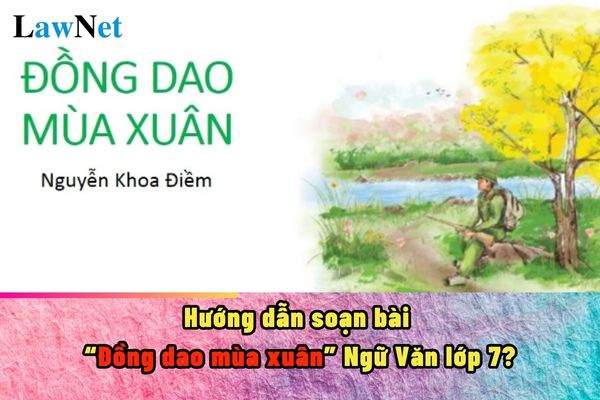Guidelines for preparing the lesson Đồng dao mùa xuân for grade 7 students in Vietnam
Guidelines for preparing the lesson Đồng dao mùa xuân for grade 7 students in Vietnam
The poem "Đồng dao mùa xuân" is located on pages 40, 41 of Grade 7 Literature in the "Ket Noi Tri Thuc" curriculum that students will learn in the grade 7 program.
Below, teachers, parents, and students can refer to the guidelines for preparing the lesson "Đồng dao mùa xuân" grade 7 Literature:
|
Prepare the lesson "Đồng dao mùa xuân" for grade 7 Literature * Main Content and General Meaning of the Poem: |
*Note: The information is for reference only./.

Guidelines for preparing the lesson Đồng dao mùa xuân for grade 7 students in Vietnam (Image from the Internet)
What are characteristics of the name of Grade 7 Literature Subject?
According to Section I of the Appendix to the General Education Literature Program issued with Circular 32/2018/TT-BGDDT, the characteristics of the name of Grade 7 Literature Subject are as follows:
- Literature is a subject in the field of Language and Literature Education, taught from grade 1 to grade 12. At the primary level, this subject is called Vietnamese; at the lower and upper lower secondary school school levels, it is called Literature.
- Literature is an instrumental and aesthetic-humanistic subject; it helps students have a means of communication, a foundation for learning all other subjects and educational activities in school; it is also an important tool for educating students about the noble values of culture, literature, and national language; it develops healthy emotions, humanistic feelings, kind and altruistic living,...
- Through word texts and vivid artistic images in literary works, by reading, writing, speaking, and listening activities, Literature plays a significant role in helping students form and develop good qualities as well as core abilities to live and work effectively, and to learn for a lifetime.
- The content of Literature is comprehensive, including knowledge of culture, ethics, philosophy,... related to many subjects and other educational activities such as History, Geography, Art, Civic Education, Foreign Languages, Natural and Social Sciences, Experiential Activities, Career Orientation,… Literature is also closely related to life; it helps students pay more attention to and be more engaged with everyday life, to relate and develop skills to solve practical problems arising in reality.
- The core content of the subject includes basic, essential knowledge and skills about Vietnamese and literature, meeting the achievement requirements for students' qualities and abilities at each educational level; it is divided into two phases: the basic education phase and the career-oriented education phase.
- Basic education phase: The program is designed according to main strands corresponding to reading, writing, speaking, and listening skills. Vietnamese and literature knowledge is integrated into the teaching process of reading, writing, speaking, and listening. The materials are selected and arranged to suit the students' receptive abilities at each educational level.
The goal of this phase is to help students use Vietnamese proficiently to communicate effectively in life and to study other subjects and educational activities well; to form and develop literary abilities, an expression of aesthetic abilities; as well as to cultivate ideas and feelings for students to grow their soul and character.
- Career-oriented education phase: The program consolidates and enhances the results of the basic education phase, helping students improve their linguistic and literary abilities, especially understanding literary texts; enhancing writing skills in more complex argumentative and informational texts in content and writing techniques; providing some specific knowledge of literary history and literary theory that are practically useful for writing and reading about literature; continuing to cultivate ideas, feelings, soul, and character so that students become responsible citizens. Additionally, in each year, students with an orientation towards social sciences and humanities can choose to study several specialized modules.
These modules aim to enhance knowledge of literature, language, practical application skills, meeting the interests, needs, and career orientation of students.
Thus, the name characteristic of the Grade 7 Literature subject, or in other words, at the lower and upper lower secondary school school levels, is called Literature. For the primary level, it is called Vietnamese Language.
What are the objectives of grade 7 Literature in Vietnam?
According to Section III of the Appendix to the General Education Literature Program issued with Circular 32/2018/TT-BGDDT, the objectives of each educational level, including the objectives of the lower secondary school level for Literature, are as follows:
- Objective 1: Help students continue to develop the good qualities formed in primary school; enhance and expand the requirements for development in qualities with specific expressions such as: being proud of the nation's history and literature; having dreams and aspirations, having self-study and self-respect spirit, having a sense of citizenship, and respecting the law.
- Objective 2: Continue to develop general abilities, linguistic abilities, and literary abilities formed in primary school with higher requirements. Develop linguistic abilities with requirements: distinguish different types of literary texts, argumentative texts, and informational texts; understand both explicit and implicit content of various types of texts; write complete, coherent, logical, and process-compliant narratives, descriptions, expressions, arguments, expositions, practical texts integrating different expressive methods; speak clearly and coherently; have confidence and appropriateness in communication contexts; listen and understand with appropriate attitudes.
Develop literary abilities with requirements: distinguish genres of stories, poems, literary scripts, and some specific sub-genres; recognize the characteristics of literary language, recognize and analyze the effect of formal elements and artistic measures associated with each literary genre; recognize emotional, cognitive, aesthetic values; analyze the figurative nature, content, and form of literary works; be capable of creating some literary products.
Hence, there are 2 objectives for Grade 7 Literature: Help students continue to develop the good qualities formed in primary school; and continue to develop general abilities, linguistic abilities, literary abilities formed in primary school with higher achievement requirements.

